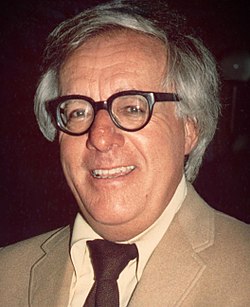Ray Bradbury Quote
Seemed to me a phone was an impersonal instrument. If it like it, it let your personality go through its wires. If it didn't to, it just drained your personality away until what slipped through at the other end was some cold fish of a voice, all steel, copper, plastic, no warmth, no reality. It's easy to say the wrong thing on telephones; the telephone changes your meaning on you. First thing you know, you've made an enemy. Then, of course, the telephone's such a thing; it just sits there and you call someone who doesn't want to be called. Friends were always calling, calling, calling me. Hell, I hadn't any time of my own.
Ray Bradbury
Seemed to me a phone was an impersonal instrument. If it like it, it let your personality go through its wires. If it didn't to, it just drained your personality away until what slipped through at the other end was some cold fish of a voice, all steel, copper, plastic, no warmth, no reality. It's easy to say the wrong thing on telephones; the telephone changes your meaning on you. First thing you know, you've made an enemy. Then, of course, the telephone's such a thing; it just sits there and you call someone who doesn't want to be called. Friends were always calling, calling, calling me. Hell, I hadn't any time of my own.
Related Quotes
Utility smart/AMR/AMI meters, cell phones and wi-fi are problem for people who do not want to get cancer, electromagnetic radiation (EMR) sickness, or Electromagnetic Hypersensitivity (EHS) in the fut...
Steven Magee
Tags:
ami, amr, cancer, cancer prevention, cell, cordless, ehs, electromagnetic, electromagnetic radiation, emf
About Ray Bradbury
Ray Douglas Bradbury (US: BRAD-berr-ee; August 22, 1920 – June 5, 2012) was an American author and screenwriter. One of the most celebrated 20th-century American writers, he worked in a variety of genres, including fantasy, science fiction, horror, mystery, and realistic fiction.
Bradbury is best known for his novel Fahrenheit 451 (1953) and his short-story collections The Martian Chronicles (1950), The Illustrated Man (1951), and The October Country (1955). Other notable works include the coming of age novel Dandelion Wine (1957), the dark fantasy Something Wicked This Way Comes (1962) and the fictionalized memoir Green Shadows, White Whale (1992). He also wrote and consulted on screenplays and television scripts, including Moby Dick and It Came from Outer Space. Many of his works were adapted into television and film productions as well as comic books. Bradbury also wrote poetry which has been published in several collections, such as They Have Not Seen the Stars (2001).
The New York Times called Bradbury "An author whose fanciful imagination, poetic prose, and mature understanding of human character have won him an international reputation" and "the writer most responsible for bringing modern science fiction into the literary mainstream".
Bradbury is best known for his novel Fahrenheit 451 (1953) and his short-story collections The Martian Chronicles (1950), The Illustrated Man (1951), and The October Country (1955). Other notable works include the coming of age novel Dandelion Wine (1957), the dark fantasy Something Wicked This Way Comes (1962) and the fictionalized memoir Green Shadows, White Whale (1992). He also wrote and consulted on screenplays and television scripts, including Moby Dick and It Came from Outer Space. Many of his works were adapted into television and film productions as well as comic books. Bradbury also wrote poetry which has been published in several collections, such as They Have Not Seen the Stars (2001).
The New York Times called Bradbury "An author whose fanciful imagination, poetic prose, and mature understanding of human character have won him an international reputation" and "the writer most responsible for bringing modern science fiction into the literary mainstream".
